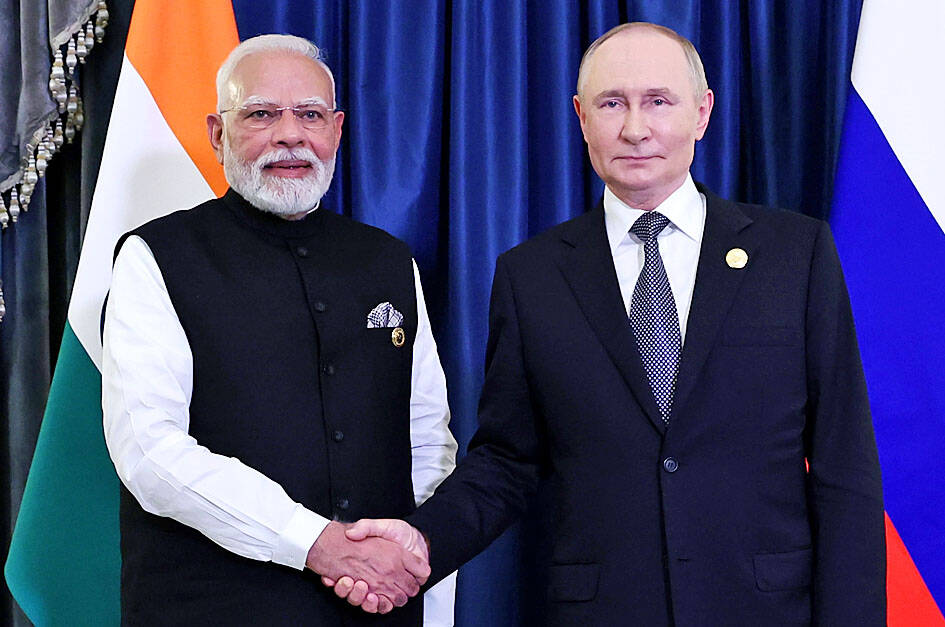Chinese President Xi Jinping (習近平) and Russian President Vladimir Putin yesterday took turns to swipe at the West during a gathering of Eurasian leaders for a showpiece summit aimed at putting Beijing front and center of regional relations.
The Shanghai Cooperation Organization (SCO), comprising China, India, Russia, Pakistan, Iran, Kazakhstan, Kyrgyzstan, Tajikistan, Uzbekistan and Belarus, is touted as a non-Western style of collaboration and seeks to be an alternative to traditional alliances.
Xi told the SCO leaders, including Belarusian President Alexander Lukashenko and Indian Prime Minister Narendra Modi, that the global international situation was becoming more “chaotic and intertwined.”

Photo: EPA / Alexander Kazakov / Sputnik / Kremlin Pool
The Chinese leader also slammed “bullying behavior” from certain countries — a veiled reference to the US.
“The security and development tasks facing member states have become even more challenging,” he said in his address in the Chinese northern port city of Tianjin. “With the world undergoing turbulence and transformation, we must continue to follow the Shanghai spirit ... and better perform the functions of the organization.”
Putin used his speech to defend Russia’s Ukraine offensive, blaming the West for triggering the three-and-a-half-year conflict that has killed tens of thousands and devastated much of eastern Ukraine.
“This crisis wasn’t triggered by Russia’s attack on Ukraine, but was a result of a coup in Ukraine, which was supported and provoked by the West,” Putin said. “The second reason for the crisis is the West’s constant attempts to drag Ukraine into NATO.”
Meanwhile, Putin praised Turkey’s mediation attempts around the Ukraine war during his first meeting this year with Turkish President Recep Tayyip Erdogan.
Turkey has hosted three rounds of peace talks between Russia and Ukraine this year that have failed to break the deadlock over how to end the conflict.
Earlier, leaders from the 10 SCO nations stood on a red carpet and posed for a group photograph.
Xi, Putin and Modi were seen on live footage chatting, the three leaders flanked by their translators. Modi and Putin, who were photographed holding hands, held talks in the afternoon.
Russian state media reported that the pair spent nearly an hour talking “face-to-face” in Putin’s armored presidential car before their official bilateral meeting.
“Conversations with him are always insightful,” Modi wrote on social media along with a photograph of them traveling in the car.
In opening comments before their meeting, Modi praised the “special and privileged strategic partnership” with Moscow.
“India and Russia have stood shoulder to shoulder, even in the toughest situations,” he said.
On the conflict in Ukraine, Modi said India wanted both sides to end it “as soon as possible and to find stable peace.”
The SCO summit, which also involves 16 more nations as observers or “dialogue partners,” began on Sunday, days before a massive military parade in Beijing to mark 80 years since the end of World War II.
The member states yesterday signed a declaration agreeing to strengthen cooperation in sectors such as security and economy, Xinhua news agency reported.
They also “unanimously agreed” to admit Laos as a “dialogue partner,” it said.

A car bomb killed a senior Russian general in southern Moscow yesterday morning, the latest high-profile army figure to be blown up in a blast that came just hours after Russian and Ukrainian delegates held separate talks in Miami on a plan to end the war. Kyiv has not commented on the incident, but Russian investigators said they were probing whether the blast was “linked” to “Ukrainian special forces.” The attack was similar to other assassinations of generals and pro-war figures that have either been claimed, or are widely believed to have been orchestrated, by Ukraine. Russian Lieutenant General Fanil Sarvarov, 56, head

SAFETY FIRST: Double the number of police were deployed at the Taipei Marathon, while other cities released plans to bolster public event safety Authorities across Taiwan have stepped up security measures ahead of Christmas and New Year events, following a knife and smoke bomb attack in Taipei on Friday that left four people dead and 11 injured. In a bid to prevent potential copycat incidents, police deployments have been expanded for large gatherings, transport hubs, and other crowded public spaces, according to official statements from police and city authorities. Taipei Mayor Chiang Wan-an (蔣萬安) said the city has “comprehensively raised security readiness” in crowded areas, increased police deployments with armed officers, and intensified patrols during weekends and nighttime hours. For large-scale events, security checkpoints and explosives

PUBLIC SAFETY: The premier said that security would be tightened in transport hubs, while President Lai commended the public for their bravery The government is to deploy more police, including rapid response units, in crowded public areas to ensure a swift response to any threats, President William Lai (賴清德) said yesterday after a knife attack killed three people and injured 11 in Taipei the previous day. Lai made the remarks following a briefing by the National Police Agency on the progress of the investigation, saying that the attack underscored the importance of cooperation in public security between the central and local governments. The attack unfolded in the early evening on Friday around Taipei Main Station’s M7 exit and later near the Taipei MRT’s Zhongshan

REBUFFED: In response to Chinese criticism over recent arms sales, Washington urged Beijing to engage in meaningful dialogue instead of threats and intimidation Washington’s long-term commitment to Taiwan would not change, the US Department of State said yesterday, urging Beijing to stop pressuring Taiwan and engage in meaningful bilateral dialogues. The remarks came in response to a backlash from Beijing about Washington’s latest approval of arms sales to Taiwan. The US Defense Security Cooperation Agency said in a statement on Wednesday that the Taipei Economic and Cultural Representative Office in the US has asked to purchase an arms package, including Tactical Mission Network Software; AH-1W helicopter spare and repair parts; M109A7 self-propelled howitzers; HIMARS long range precision strike systems; tube-launched, optically tracked, wire-guided missiles; Javelin